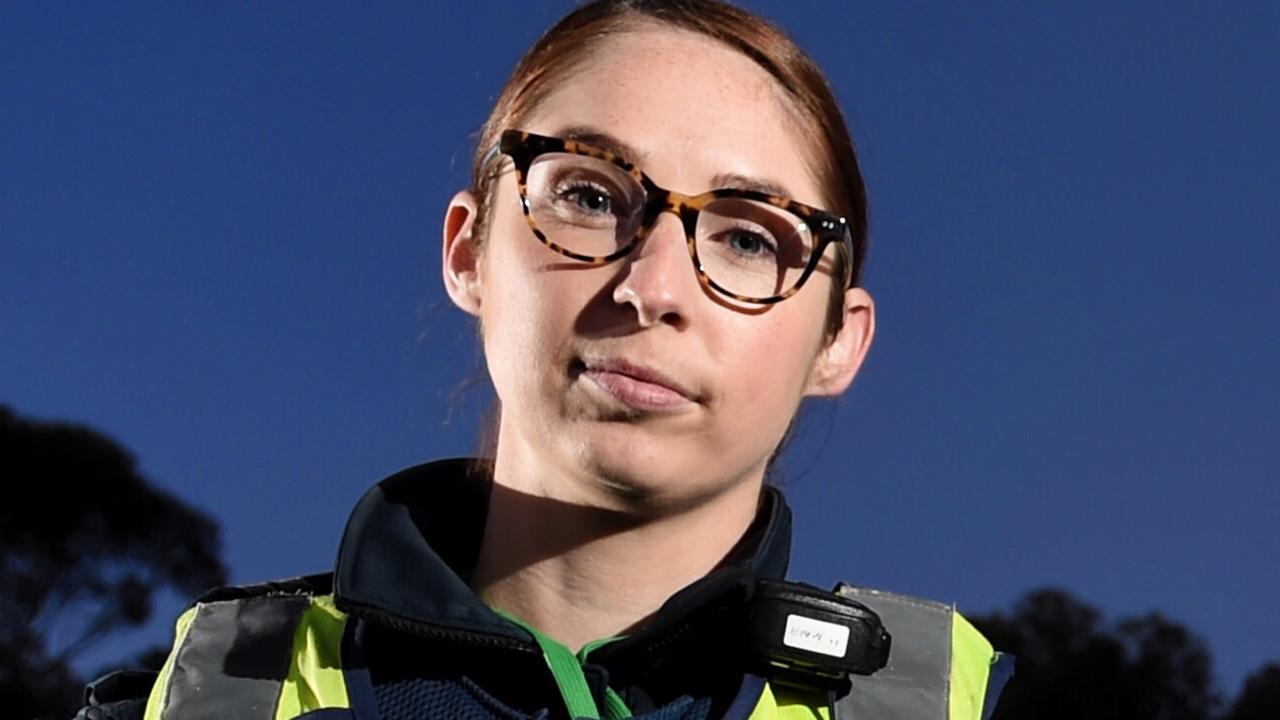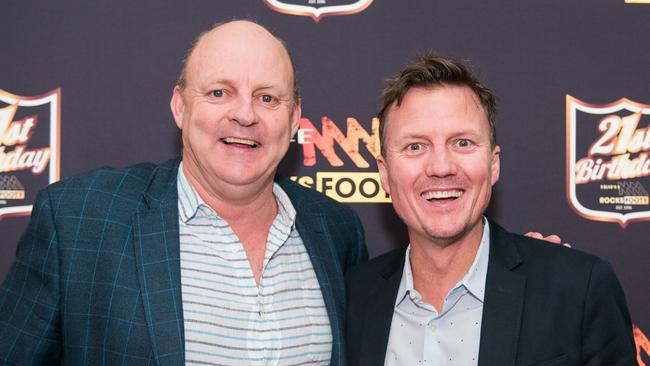The rewards and challenges of raising a child with a high IQ
MANY parents dream of having a gifted child. No last-minute calls for help with homework, stellar grades, a secure future. But the reality of parenting a child with a high IQ is very different.
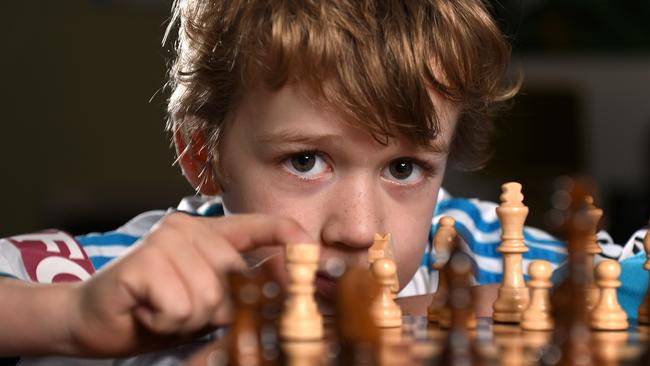
VIC News
Don't miss out on the headlines from VIC News. Followed categories will be added to My News.
MANY parents dream of having a gifted child. No last-minute calls for help with homework, stellar grades, a secure future.
But the reality of parenting a gifted child is different. There is the pressure of choosing the right school, negative attitudes toward gifted students, as well as a risk of boredom, frustration, underachieving, loneliness and potential for anxiety.
Experts regard gifted children as those who perform in the top 3-5 per cent of the population on a recognised, individual IQ test. One in 10 Australian children is believed to be gifted or talented.
Gifted children are born with innate gifts well above the average. On the other hand, talented children have been able to develop their gifts to achieve high levels in areas such as sports, arts and the classroom.
“Having a gifted child is wonderful but it also raises some unique challenges,” Raising Children Network deputy director Dr Julie Green says.
One of the biggest challenges, she says, is accepting that the emotional development of gifted children is usually commensurate with their age while their intellectual development is more advanced. The result is a type of race between their brain and emotions, which can cause frustration, distress and even impairment.
“It’s really all about understanding the individual child, ensuring their learning needs are met and keeping an eye on their emotional development, so parents need to help create and foster a good peer group for the child,” Green says.
A 15-month Victorian parliamentary inquiry into the education of the brightest and most talented children in 2012 found there were up to 85,000 gifted students in Victoria.
While giftedness is recognised more and more in schools, experts say there is still much work to be done.
Victorian Association for Gifted and Talented Children president Carmel Meehan is pushing for undergraduate teachers to have at least one compulsory unit in their education degree dedicated to gifted children. Understanding more about gifted children is the key to coping with them in the classroom and helping ensure they flourish rather than stagnate, she says.
“They are sometimes very lonely little children — all around them are children playing with cars and they’re fascinated with the solar system — so they often end up talking to the teachers more than their peers,” Meehan says. “Some schools that are developed in this area work hard to connect gifted children with each other so they can form good friendships at school.”
Parents in rural areas feel particularly isolated, Meehan says, relying on the internet for information, which can be helpful or confusing when all they want is to do the best for their child.
“Parents will say, ‘My child is advanced’ and they are talked down by other parents and even their own families sometimes because it’s the Australian tall poppy syndrome,” she says. “This starts at an early age. The parents say they don’t talk about it because it looks boastful when they should be able to say their child has a special talent. I advise them to normalise it and remember that we all have a special talent.”
Educational psychologist and chair of the CHIP (Children of High Intellectual Potential) Foundation Dr Gail Byrne says more knowledge is the key to helping parents navigate through the challenges of having a gifted child. She agrees that giftedness should be a compulsory part of teacher training.
“The classroom is usually the first port of call if something is going wrong with a child and this is not really seen as a priority area because schools often have a focus on children who are not reaching the benchmarks, not on those who are exceeding that benchmark,” Byrne says.
Meehan says it is essential that gifted children be taught at a level that corresponds to their ability.
“It’s about giving them the best education for the things they are good at and not dumbing them down. Their education should stretch them in areas where they are high and support them in areas were they need support. They also need emotional support because high intellectual ability often means increased sensitivity.
“All children, and especially gifted children, love to learn. If they’re in a situation where everyone else is labouring over something they got straight away, they become bored. If you’re bored and smart you find ways to distract yourself.”
Choosing the right school is crucial, Green says.
“The risk is that those kids may be misunderstood and there is a risk they might disengage,” Green says. “There are social and academic consequences for that.”
But there are also pleasures in raising a gifted child.
“Parents say it’s entertaining and incredibly stimulating to raise a gifted child,” she says. “Not having all the answers is a challenge so they either figure out a way to find the answers or accept that it’s OK not to have all the answers. Raising children is something that is learned on the job and the more help all parents have, the better.”
The 2012 Victorian parliamentary report found the education system was letting gifted students down, with only sporadic provision for them and a hit-and-miss approach to identifying them. The report found that failing to provide appropriately for gifted students could have devastating consequences.
The inquiry found children in lower socio-economic groups were more likely to have their abilities overlooked and called for a more systematic approach to teaching gifted children.
The report recommended all schools identify their gifted students and work to provide a different curriculum for them. Since then, the Department of Education and Training has provided funding to the Raising Children Network to develop online resources, funded the development of extension programs for students, established a Gifted and Talented Education Expert Reference Group and put money into developing online resources to help parents and teachers identify and support gifted children and students that are expected to go live in January.
Steve Tolley, a spokesman for Education Minister James Merlino, says the State Government has committed to creating a new curriculum to lift the lowest and highest levels of achievement.
“We have also set ambitious targets for more of our kids to reach the highest levels of attainment,” he says.
A pilot was launched this year where selective entry high schools provided outreach activities for students.
The Department of Education and Training is also developing new guidelines to ensure greater consistency among accelerated learning programs.
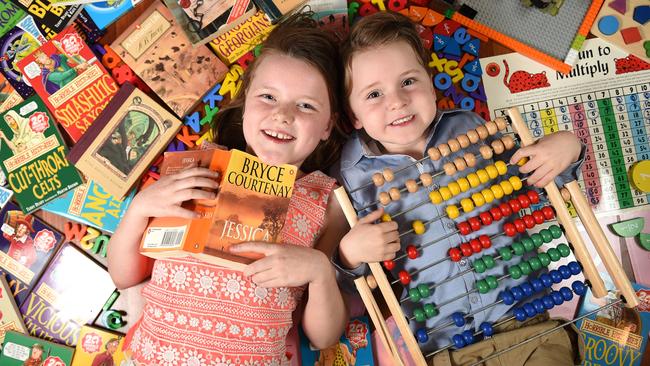
JESSICA AND CHARLIE VAN LOON
PATIENCE has become a hallmark of Briony van Loon’s parenting style.
The 35-year-old is the mother of gifted children Jessica, 8, and Charlie, 4.
“Sometimes I just want eating a bowl of cereal to be a simple act but when they are in that head space where they can’t stop reading, it’s very hard to shift their focus,” van Loon says.
“It’s not their fault. I used to be quite hard on them before I knew they were gifted but now I just bring them back to focus. After five years of having these conversations, it’s working.”
On learning Jessica was gifted when she was five, Briony set about finding out everything she could about giftedness, seeing that Jessica became depressed when she was not understood.
Childcare workers knew Jessica was under-challenged when she was 18 months old, so they moved her into the three-year-old group.
She wanted to play chasey, make crafts and have more variety in her day. When she turned three she went to an early learning centre that was shut down a few months later.
“All of a sudden she chose to play by herself, she was depressed and just not my little girl any more,” she says.
Once she moved to school, she expected it to be well-equipped to deal with Jessica’s needs but she was bored and teased by other children.
It was the school psychologist who first suggested she could be gifted and external tests confirmed it. But more challenges lay ahead.
“I spoke to the head of school who said, ‘There’s no such thing as giftedness’ but I had already done enough research to know that the brains of gifted children are wired differently,” Briony says.
“I went to 27 different schools and interviewed the principals. At the very last school the principal had been trained in giftedness and she knew exactly what Jess needed. I enrolled her straight away.”
But Jessica only flourished for a year at that school and was struggling again by the second year.
Again, her mother went to 17 different schools all over Melbourne until she found the dream school on the Mornington Peninsula, where there is a high population of gifted children.
It is finally working well for her and Jessica is progressing. She is advanced in literacy, drama and can play music by ear. She started reading whatever took her fancy last year, including Bryce Courtenay.
“She has the cognition of a 13-year-old and the emotions of an eight-year-old so there is a lot of anxiety between those two gaps.”
Similarly, Charlie is also showing signs of being gifted.
He is a quick thinker, a perfectionist and his best friend is seven, which works well because he often sees more complexity in social situations than is really there.
Just like his sister, Charlie was walking and talking at nine months and at 18 months he was speaking in fully formed sentences.
He is undergoing tests for giftedness but all the signs are there.
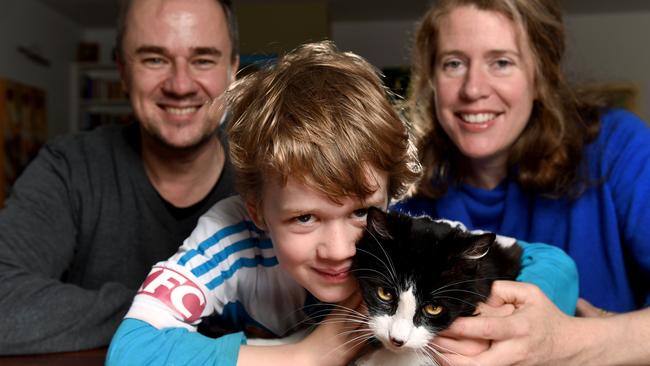
THOMAS RIVERS
LITTLE Thomas Rivers, 5, is on the cusp of being profoundly gifted.
A firstborn, his parents Justin Mahon, 43, and Zoe Rivers, 42, didn’t realise anything was unusual when Thomas started speaking in fully formed sentences at 18 months and reading at four.
“Once our friends made the observations about him being particularly bright we decided we needed to be more observant ourselves and started thinking about whether he might be gifted,” Mahon says.
“But we didn’t want to get him tested formally until he was about to start school because we were concerned we made the right choice in school and to ease that transition between home and school. We wanted that document to be able to show to his school.
“We also had a sense that giftedness is not necessarily a gift.”
Thomas’s gifts are broad, ranging from language to science and mathematics. He attends a Vietnamese bilingual school in Footscray so he learns maths and science in Vietnamese.
But, like many gifted children, while he is intellectually advanced, his fine motor and emotional development is more delayed.
The challenge for his parents, both public servants, is to keep challenging Thomas.
“We are driven by his constant need for engagement. If he’s not engaged, he can be destructive. A bored Thomas is a very bad thing and it’s not fair to him either.”
Thomas is fascinated with the world.
“He likes fantasy play but there are times he is more interested in the periodic table of elements,” he says.
“He often asks higher order questions. It’s not only ‘why’ that interests him but also ‘how’. He has shown an inclination to understand the natural world and is very interested in the stars but he is very quick to ask difficult questions such as, ‘What happens when the stars stop?’ He goes to existential issues of life.
“We want children to ask those higher order questions, but we also have to manage it.
“We can’t avoid the question because he will call us on it but we also have to be very cautious about how to engage on bigger issues.”
TIPS FOR PARENTS
● If your child seems to have advanced natural abilities or advanced development compared with other children, or is achieving at a very high level, they might be identified as gifted or talented.
● Havingyour child assessed can assist you to work out the best way to support your child’s development and learning needs.
● Assessment or identification can be formal, such as testing through a psychologist, or informal by keeping a record of your child’s development and achievements and also through others’ observations, for example, your GP or maternal and child health nurse.
● You can support your child by linking them with the right learning opportunities and activities that develop their talents in their area of natural ability. This can include programs run by associations for gifted children, sporting programs, music lessons, drama and creative arts programs, and more.
● Reassure your child that you love and support them and that their gift is a part of who they are.
Source: Raising Children Network
The Raising Children Network has developed an online resource for parents of gifted and talented children, in collaboration with Victoria’s Department of Education. See the gifted and talented section of the website at raisingchildren.net.au/giftedchildren.

